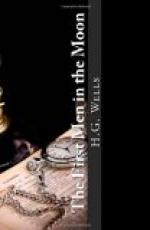“That’s easy,” he said, and set about proving it. He produced a big piece of crumpled paper from the bale, lit it, and thrust it hastily through the man-hole valve. I bent forward and peered down through the thick glass for its appearance outside, that little flame on whose evidence depended so much!
I saw the paper drop out and lie lightly upon the snow. The pink flame of its burning vanished. For an instant it seemed to be extinguished. And then I saw a little blue tongue upon the edge of it that trembled, and crept, and spread!
Quietly the whole sheet, save where it lay in immediate contact with the snow, charred and shrivelled and sent up a quivering thread of smoke. There was no doubt left to me; the atmosphere of the moon was either pure oxygen or air, and capable therefore—unless its tenuity was excessive—of supporting our alien life. We might emerge—and live!
I sat down with my legs on either side of the manhole and prepared to unscrew it, but Cavor stopped me. “There is first a little precaution,” he said. He pointed out that although it was certainly an oxygenated atmosphere outside, it might still be so rarefied as to cause us grave injury. He reminded me of mountain sickness, and of the bleeding that often afflicts aeronauts who have ascended too swiftly, and he spent some time in the preparation of a sickly-tasting drink which he insisted on my sharing. It made me feel a little numb, but otherwise had no effect on me. Then he permitted me to begin unscrewing.
Presently the glass stopper of the manhole was so far undone that the denser air within our sphere began to escape along the thread of the screw, singing as a kettle sings before it boils. Thereupon he made me desist. It speedily became evident that the pressure outside was very much less than it was within. How much less it was we had no means of telling.
I sat grasping the stopper with both hands, ready to close it again if, in spite of our intense hope, the lunar atmosphere should after all prove too rarefied for us, and Cavor sat with a cylinder of compressed oxygen at hand to restore our pressure. We looked at one another in silence, and then at the fantastic vegetation that swayed and grew visibly and noiselessly without. And ever that shrill piping continued.
My blood-vessels began to throb in my ears, and the sound of Cavor’s movements diminished. I noted how still everything had become, because of the thinning of the air.
As our air sizzled out from the screw the moisture of it condensed in little puffs.
Presently I experienced a peculiar shortness of breath that lasted indeed during the whole of the time of our exposure to the moon’s exterior atmosphere, and a rather unpleasant sensation about the ears and finger-nails and the back of the throat grew upon my attention, and presently passed off again.




